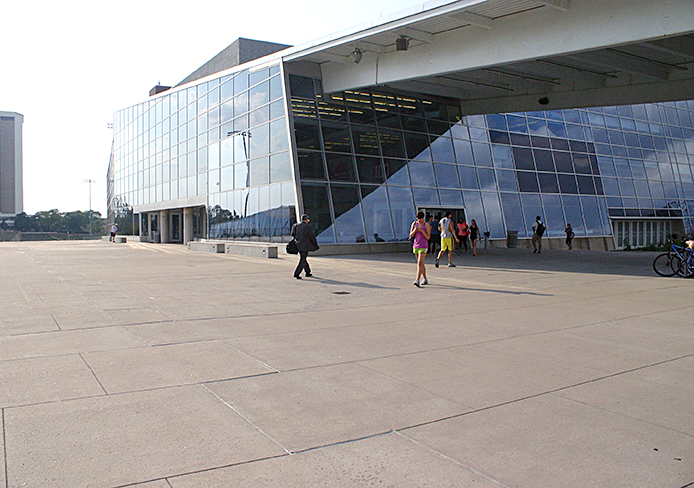
The southeast entrance of the RPAC Sept. 9. The RPAC now opens at 5:30 a.m. Monday through Friday, 15 minutes earlier than the former opening time.
Credit: Amanda Carberry / Lantern photographer
If you want to get in an early morning workout on a new piece of equipment, the RPAC can accommodate you. But you still might not have a locker to hold your book bag, gym bag, cell phone or any other personal belongings you don’t want to lug around while hitting the machines.
The RPAC is now open at 5:30 a.m. Monday through Friday, a 15-minute change from the former opening time that isn’t costing any additional money, Emily Howard, marketing and creative services program manager from OSU Student Life Department of Recreational Sports, said in an email.
“In the past we opened at 5:45 a.m.,” Howard said. “We made this choice to meet the needs of students and members wanting an earlier opening time so they could get in a full workout and freshen up before class or work … Rec Sports staff have always arrived for the early shift at 5:15 a.m., and therefore we could accommodate the 15 minute change with minimal impact.”
In addition to a earlier opening time, new workout machines are projected to be purchased this year.
“Most machines in our facility have a three-year life span of wear and tear before they need to be replaced. We do test/sample new equipment for people to try before we purchase,” Howard said.
The annual budget for the replacement of equipment is $500,000, Howard said.
While there are new additions in place or forthcoming at the RPAC, the system of acquiring a locker still remains the same as last year, already leaving some users without a guaranteed locker for the semester.
To reserve a locker for the semester for one of the almost 900 men’s locker room lockers or one of the nearly 650 women’s locker room lockers, students or others must submit an online request for the upcoming semester to be chosen for the locker lottery, Howard said.
After an individual has been chosen from the locker lottery, they can choose to purchase a large locker at $78 per semester or a medium locker at $42 per semester.
The locker lottery is closed for the semester, though, leaving 300 first-come-first-serve daily use lockers, which are free to members.
“There is a stronger demand for lockers than availability; therefore the lottery was the fairest way to assign lockers for the semester,” Howard said.
Some students said, however, the locker lottery system does not suffice the needs of RPAC users.
“I think that there should be more free lockers available for daily use. $500,000 a year for new equipment seems excessive, so maybe the locker funding could come from that,” said Zach Clark, a third-year in chemistry.
Other students said the lottery system is ineffective due to lack of knowledge of the lottery.
“Honestly, I think many students have no idea that there even is a locker lottery. The only reason I’m educated about the locker lottery is because I was in an EDUPAES (Education: Physical Activity and Education Services) fitness class last semester,” said Claire Fox, a third-year in exploration.
Fox said the amount of people that use the RPAC compared to the amount of daily use lockers is unrealistically low, and there should be more available for daily use.
Howard said a locker reservation, though, can be cancelled, opening up more lockers.
“The lottery has allowed us to fulfill most requests for a locker within one semester of the original request. Once you sign up for a locker, your reservation is guaranteed on going unless you choose to cancel or stop paying for the service,” Howard said.
All Ohio State Columbus campus students taking four or more credit hours pay a $123 recreational fee per semester.
Recreational Sports also receives funding from facility rentals, paid memberships from part-time students, faculty, staff, alumni and affiliates, sales of small goods, program participation fees such as personal training and camp programs and work-study wages, Howard said.
Madelyn Grant contributed to this article.


